
|   |

|   |
Interplay Arts Festival - Banu Muthukumar e-mail: banu27@gmail.com July 25, 2024 On June 29, 2024, Bay Area welcomed the first edition of the Interplay Arts Festival - a live music and dance festival with presentations from 9 dancers and 30 musicians this year. The festival was conceptualized, curated and organized by Nitya Narasimhan, the Artistic Director of Prayukti Arts. Addressing the scarcity of live music and dance performances in the US beyond just "arangetrams", this first-of-its-kind festival has laid the groundwork for creating a community where dancers and musicians can start forging lasting relationships. This initiative creates an ecosystem not only for artistes but also for rasikas, offering a space for enjoyable live performance experience from experienced and budding artists. The festival began with a mesmerizing performance by Sanjana Melkote. She presented "Akhilandeshwari", beautifully conceptualized to show the Goddess as mother nature herself. The usage of Tanam to depict trees growing, done with exceptional finesse by Sanjana was captivating. Kesav Viswanadha's soulful rendering of Dvijaavanti, skillfully accompanied by Aparna Ganapathi's violin and Sumanth Ganapathi's flute and supported so subtly but aptly by Rishi Kodungallur's mridangam truly elevated this piece. 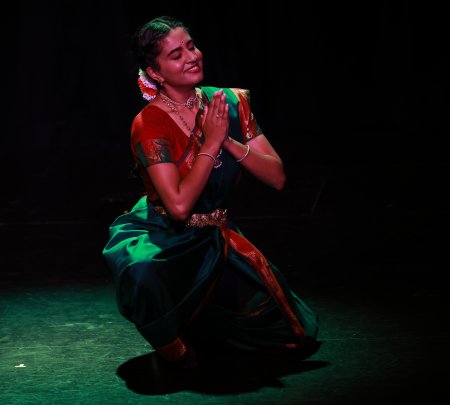 Sanjana Melkote 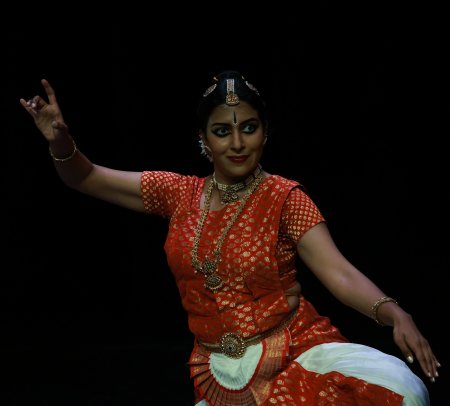 Priyanka Raghuraman Next, Priyanka Raghuraman performed "Aadum Paadhanai" accompanied by Veena Velury on vocals. The crisp jathi at the beginning, well supported by Varsha Sankar's nattuvangam, provided a commanding start. Priyanka's embodiment of Shiva through various poses, executed with seeming ease, truly captured his majestic spirit. Sasi Madugala provided excellent support on the violin, and Vidarth Anbu's dynamic mridangam made the ending damaru segment powerful and all-encompassing. Jayashree Seshadri presented the famous kriti by Papanasam Sivan, "Sivagaama Sundari," interspersed with verses from the Abhirami Anthathi. What immediately stood out in her performance was her precise footwork, accentuated by Aishwarya Chandrashekar's expert nattuvangam weaving through complex talam patterns. The musicians (Aditya Kota on mridangam and Vishaka Ashok on violin) were fully engaged, resulting in a truly collaborative performance. Particularly enjoyable was Jayashree's depiction of Bhattar's state after Abirami comes to his rescue, with Varushini Ramesh's voice beautifully complementing his emotions. 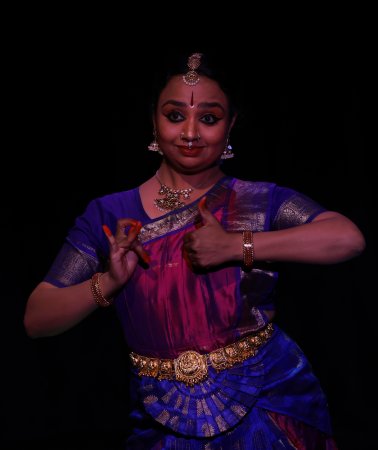 Jayashree Seshadri 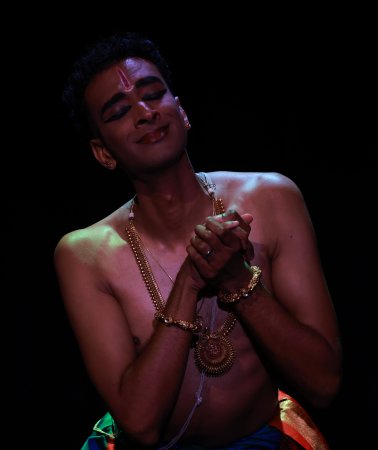 Vinay Srininvasan Vinay Srininvasan presented "Panimathi," a composition by Maharaja Swathi Thirunal. The violin sanchari by Sasi Madugula at the beginning was a beautiful portrayal of the nayika's lovelorn state. A special mention goes to Kavitha Ramaswamy's haunting voice, which matched the song and mood perfectly. Vinay's expressive eyes eloquently carried this slow padam. The depiction of the nayika's imagined intimacy with her Lord was particularly captivating. Shiva R. Iyer's subtly nuanced mridangam and Aishwarya Chandrashekar's nattuvangam provided excellent support. Following four presentations by local artists, Neha Venkatesh from Seattle, delivered a power packed margam. She commenced with "Om Saravana Bhava," a composition by Ghatam Karthik. Neha's dynamic entry onto the stage not only set the tone for the first piece but for her entire performance. Archana Raja's impeccable nattuvangam, with flawless enunciation of the verses, was particularly delightful, only enhanced by Siva Prasad on the mridangam. Neha skillfully intertwined Muruga's valor with the occasional graceful peacock in interludes. Next, Neha presented the Daru varnam, "Maathe." The jathis in this varnam were incredibly intricate; the mel kalam of the trikala jathi saw a spirited "interplay" between the nattuvangam and the dancer, the Tisra jathi was a treat, Neha's agile movements well complemented by Archana's steadfast support. The second half of the varnam celebrated Devi in all her glory, focusing on different aspects of her divine persona, enriched by Binu Venugopal's gripping vocal rendition. The swaram portraying her as the "fish-eyed one" was particularly exquisite, leaving the audience spellbound. Following the varnam, Neha presented "Rusli Radha, Rusla Madhav" in Misra Yaman, a padam in Marathi. Neha's light hearted depiction of the lover's tryst and everything in Gokul reflecting it, including the lotus and its leaf, transported the audience to Gokul, everyone eagerly awaiting their reconciliation. A shout out to Eashwar Ramakrishnan's exceptional violin accompaniment in this piece. She concluded with Balamuralikrishna's Behag thillana. Choreographed to have a different ending in each repetition of the pallavi, the thillana was the perfect finale, with Neha exuding joy in every movement and concluding the first half of the festival on a high note. 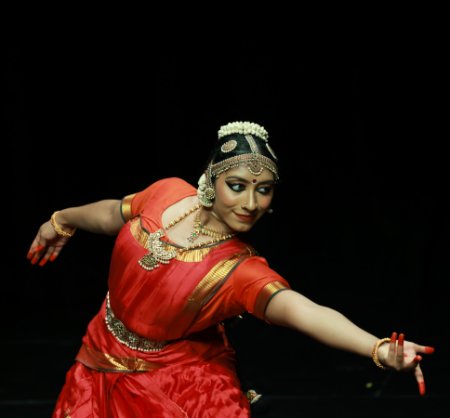 Neha Venkatesh 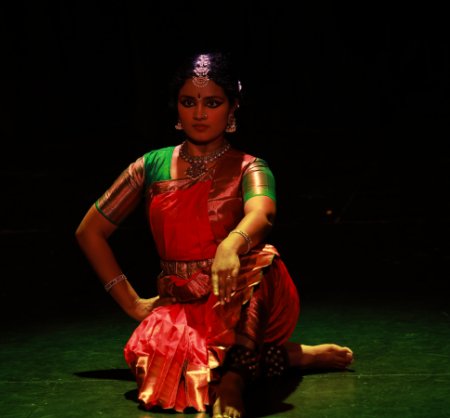 Surya Ravi To kick off the second half, Dr. Divya Raghavan from Natya (one of the event sponsors) delivered an insightful talk on injury prevention and management for dancers. Following this, Surya Ravi presented "Bhavani" featuring verses from Adi Shankara's Tripura Sundari Ashtakam. Surya's adept portrayal of the fierce warrior goddess was complemented by Janani Aiyer's evocative voice and Aditya Kota's mridangam. Vivek Ramanan expertly rendered jathis, which he also contributed to composing, uplifting the piece. Priyanka Chary's veena provided a balancing element akin to Devi's nurturing nature, imparting a serene touch amidst the intensity. Srividhya Srinivasan followed with the padam and javali segment, starting with the evergreen "Era ra," a piece that never fails to entertain. Srividhya's twist of persuading Cupid to deliver her message to Krishna was well received. The accompaniment by Priyanka Chary's veena added a new dimension to the javali. She then performed the padam "Netru Andhi Neram," beautifully sung by Nandita Sriram. Srividhya's portrayal of betrayal was compelling, enhanced by Chetana Sastry's nattuvangam and Manav Balan's appropriately subtle mridangam. 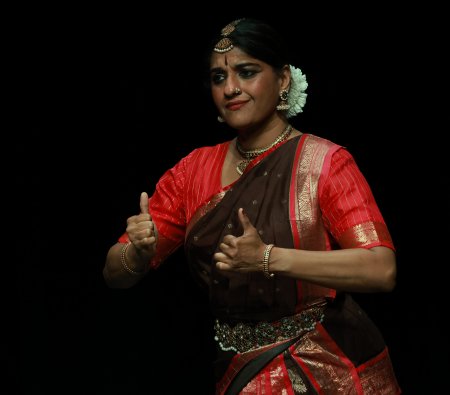 Srividhya Srinivasan 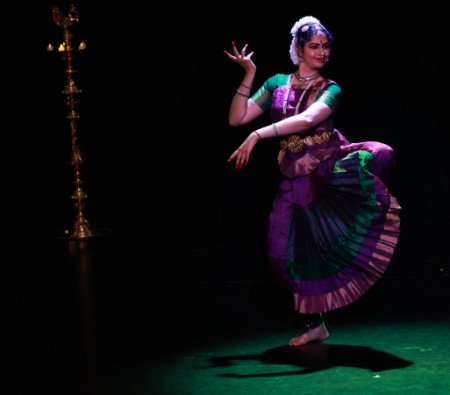 Varsha Sankar Varsha Sankar presented a Drupad. Structurally very close to a thillana, this was the concluding piece by local guest artists. Choreographed by Dr. Padma Subrahmanyam, the piece was rich with karanas and Varsha's command over them was engaging to watch. Supported by Shiva R Iyer on mridangam and Aishwarya Chandrashekar, her graceful rendition of this unique Drupad, where musical notes are depicted as originating animals, culminated with the profound message of "Nirguna Brahma Asmi." Varushini Ramesh's emotive vocal rendition captured this essence well. 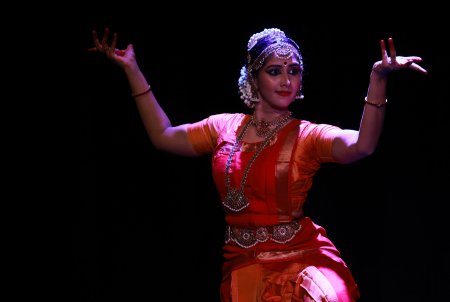 Nitya Narasimhan The final segment of the festival featured a thematic presentation titled "rIti" - the interplay of conversations, by Nitya Narasimhan. Her presentation sought to explore how relationships, situations, and the recipient influence the dynamics of dialogue within the margam format. Beginning with a commanding portrayal of Devi, Nitya captivated the audience as she portrayed Devi's valor, grace, compassion, and authority. Her ability to delineate nuanced differences between various aspects of Devi demonstrated her maturity and depth as a dancer. Archana Raja's skillful nattuvangam was highlighted alongside Binu Venugopal's powerful vocals and Siva Prasad's impeccable timing on the mridangam, showcasing a seamless coming together of music and dance. Nitya continued with a varnam by the Tanjore quartet - "Mohamaana" - an intimate sharing of vulnerability between the nayika and her friends. The beautiful sanchari depicting Maaran's attacks along with Eashwar Ramakrishnan's expressive violin capturing the pleasure as well as the intensity of the nayika's emotions was delightful. Her confident nayika in the second half was a joy to watch. The varnam was followed by an abhinaya segment, where Nitya presented three very different types of conversations. The ashtapadi, "Priye Charusheele" was exquisitely done carrying the audience through Krishna's journey, his all-encompassing love for Radha, his torment at her anger and finally his surrender at Radha's feet. Even as the audience were empathizing with Krishna, Nitya transformed into a sarcastic bhakta, performing a Ninda stuti, playfully chiding Lord Nataraja. Her skill at portraying bhakti through sarcasm while eliciting laughter from the audience was delightful. Continuing with the famous "Vishamakara Kannan", Nitya transformed into the narrator, expertly breaking the fourth wall and reporting on naughty Krishna's antics. The sanchari where Krishna coaxes a neighbor girl to sing a song was particularly amusing, drawing enthusiastic hoots of laughter from the audience and highlighting Nitya's flair for comedy. Concluding with the emotionally charged "Kantamam," a conversation from sound to silence left the audience feeling a profound connection with the divine through ultimate surrender. The first edition of Interplay Festival was a resounding success. Kudos to the organizers and support team to have pulled off a festival at this scale. 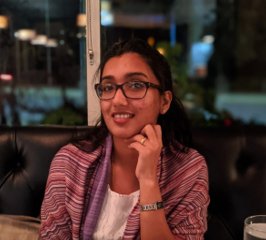 Banu Muthukumar is a software engineer by profession, a Bharatanatyam dancer by passion and an avid dance rasika. |